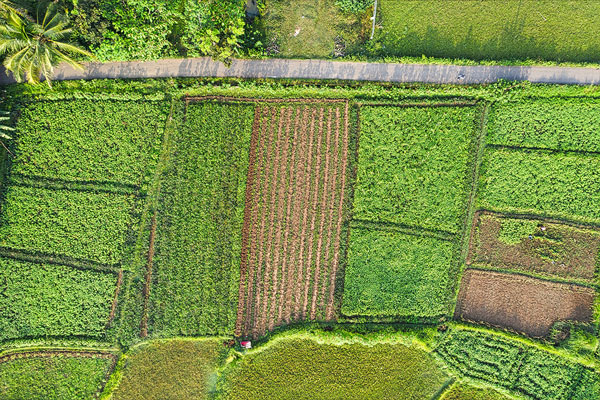Deforestation is a global environmental issue that threatens biodiversity, disrupts climate balances, and undermines vital natural resources essential for human survival.
Despite growing awareness of the importance of preserving our forests, deforestation remains a pressing challenge, driven by various economic, social, and political factors.
In this article, we will explore the main causes of deforestation, debunk some common myths surrounding forestry practices, and discuss feasible solutions that can be implemented both globally and locally, such as promoting responsible, sustainable and FSC™ certified forest management.
What is deforestation?
Deforestation refers to the extensive felling of trees at a rate faster than their ability to regenerate.
This practice leads to the loss of fertile soil and contributes to progressive desertification. It is distinct from logging, which is the cutting of trees that does not necessarily exceed their regrowth capacity.
The repercussions of deforestation are numerous, including the transformation of ecosystems and the reduction of biodiversity. This compromises the ability of habitats to adapt to climate changes and diseases, intensifies the frequency and severity of fires, and accelerates the desertification process.
Moreover, deforestation significantly increases carbon dioxide levels in the atmosphere, playing a crucial role in global warming.
Causes of deforestation
Deforestation is a complex phenomenon involving various economic, social, and political factors that not only threaten ecosystems but also alter the global climate balance.

Let’s examine the main causes of forest destruction:
- Agricultural expansion: according to the FAO, the conversion of forests into agricultural lands accounts for at least 50% of global deforestation, particularly in the Amazon for crops like soy and palm oil.
- Intensive livestock farming: in Brazil, vast forest areas are cleared to make way for pastures, increasing greenhouse gas emissions and reducing natural habitats.
- Resource extraction: activities such as mining in countries like the Democratic Republic of the Congo and Indonesia accelerate deforestation for the extraction of minerals and timber.
- Urbanization: urban and infrastructural development often requires the destruction of forests, compromising their ability to absorb CO2, which is essential against climate change.
- Wildfires: natural and human-caused fires, such as land clearing for agriculture, intensify deforestation, a situation worsened by global warming.
- Inadequate Policies: deforestation is often facilitated by insufficient policies and corruption, allowing the continuation of harmful practices despite regulations.
Myths about deforestation
There are numerous misconceptions accompanying discussions about trees, plants, and deforestation.
Let’s debunk the 3 most common myths and provide more accurate information based on data and scientific research.
More wood and paper means fewer forests: false
This misconception overlooks the concept of sustainable forest management. Responsibly managed forests can indeed provide wood and paper without compromising their ability to regenerate.
Sustainable use of forest resources ensures that the cutting of trees is balanced by the planting of new trees and the conservation of biodiversity.
Forests should never be touched: false
The erroneous idea of leaving forests completely intact fails to recognize that active forest management can actually promote the health and resilience of ecosystems.
Silviculture, when practiced correctly, mimics the natural dynamics of the forest, helping to maintain a balanced and sustainable ecosystem.
Italian forests are in danger: false
Contrary to this popular myth, the forest area in Italy has significantly increased over recent decades.
This increase is mainly due to changes in land management and the abandonment of agricultural practices in some areas, allowing forests to reclaim spaces previously used for agriculture.
Effective solutions to prevent deforestation
So, how do we combat deforestation? The fight against deforestation requires an integrated and multi-level approach that includes government policies, private sector initiatives, and individual actions.

Effective strategies to combat deforestation include improving forest governance, strengthening laws, supporting sustainable agriculture and alternatives to deforestation, through techniques such as agroforestry, which integrates trees and crops, can increase agricultural productivity while simultaneously protecting the ecosystem.
Investment in innovative technologies to monitor and manage forests, public education and awareness about sustainable products, and financial support and incentives for forest conservation, such as REDD+ programs (Reducing Emissions from Deforestation and Forest Degradation), are also crucial.
Packly against deforestation
At Packly, we care deeply about our planet and, to promote forest conservation and prevent deforestation, we take multiple actions.
In addition to complying with the European Union Timber Regulation (EUTR), we also offer our customers the option to request FSC™ certification (license code: FSC-C147372) for their products.
The European Union Timber Regulation (EUTR)
The EUTR aims to counteract the trade of illegal timber and timber products by encouraging responsible sourcing. For cardboard-using industries, it is crucial to ensure that these materials come from legal and sustainable sources.
What are the main obligations of the EUTR?
- Due Diligence System: Companies must implement systems to verify the legal origin of the cardboard, assessing and mitigating the risks of illegality.
- Material Traceability: Maintain detailed documentation that traces the origin of the cardboard from the forest to the final product, ensuring the legality of the raw materials.
- Risk Assessment: It is necessary to evaluate the possibility that the cardboard is produced in violation of local or international laws.
Documentation and Archiving: Carefully preserve all documents that demonstrate compliance with the laws, including invoices, supply contracts, and certificates of legality.
From December 30, 2024, the EUTR will be replaced by the new European Deforestation-free Products Regulation (EUDR). With the introduction of this regulation, the European Union will impose stricter rules to combat deforestation.
FSC™ certification and its impact
The FSC™ certification is one of the most influential and globally recognized tools for promoting sustainable forest management.
For our packaging, we purchase only from European mills certified by FSC™ because this certification ensures that forests are managed in a way that respects the environment, local communities, and the economy.
This certification, which can be requested by our customers, imposes high standards for sustainable forest management, improving wood traceability and ensuring that products come from responsible sources. This increases consumer trust and promotes sustainable practices in the global market.
It also has social benefits: it improves the living conditions in forest communities and contributes to the fight against climate change through management that promotes carbon reduction, reducing the impact of CO2 emissions.
Deforestation: the challenge of our time
Deforestation remains one of the most serious environmental challenges of our time, threatening global biodiversity, destabilizing local and global climates, and compromising the natural resources on which human life depends.

However, as we have seen, there are well-defined causes and, above all, feasible and effective solutions to address this issue, such as choosing sustainable packaging and certified FSC™ products, supporting policies that promote sustainability, and educating ourselves and others about the real causes and consequences of deforestation.
Join us in promoting responsible forest management: purchase our packaging on Packly and make a difference for the planet.













